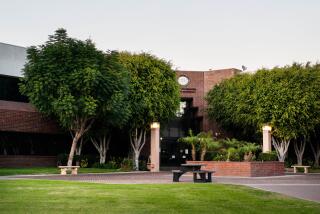Alumnus donates $17 million to USC
- Share via
Real estate developer Sonny Astani frequently used his USC engineering degree during his career. He would examine zoning regulations at potential projects, find solutions for parking problems, study elevator shafts. “Engineers were surprised that a broker knew more than they did,” he said.
That background, plus his work on a $400-million mixed-use project in downtown Los Angeles, are the driving forces behind his $17-million donation to USC to advance the study of “megacities.”
For Astani, the need for such study became apparent when he started developing the Concerto complex on Figueroa Street. Building the 619-unit project in the middle of downtown was such a daunting task that Astani began consulting with engineers, reading books and even taking a few classes at his alma mater.
“There really are no guidelines, so I had to learn a lot of new things,” said Astani, who earned his master’s degree from USC in 1978.
The process convinced Astani, the president of Astani Enterprises, that a new generation of engineers was needed to tackle future projects in Los Angeles and other big cities. His gift is prompting USC’s engineering school to name an engineering department after him and dedicate it to the study of urban areas that have 10 million or more residents.
There are 15 megacities worldwide, including Los Angeles and New York.
It’s unclear how many universities have engineering departments focusing on large cities, but Los Angeles could benefit from an organized, academic approach to the subject, said Joel Kotkin, a presidential fellow in urban futures at Chapman University in Orange.
The gift is scheduled to be announced today.
USC had already been focusing more academic energy on studying megacities in recent years, but Astani’s gift will provide a significant boost, said Jean-Pierre Bardet, the chair of USC’s civil engineering program.
“We can say that Los Angeles is our laboratory,” he said.
Astani, 52, said he hoped his gift would encourage more students to think about engineering creatively and that it could help develop guidelines for the future, either in city halls or the private sector, in Los Angeles or other megacities across the globe.
“If they say, ‘This is the way to do it,’ developers will listen,” Astani said.
More to Read
Inside the business of entertainment
The Wide Shot brings you news, analysis and insights on everything from streaming wars to production — and what it all means for the future.
You may occasionally receive promotional content from the Los Angeles Times.











